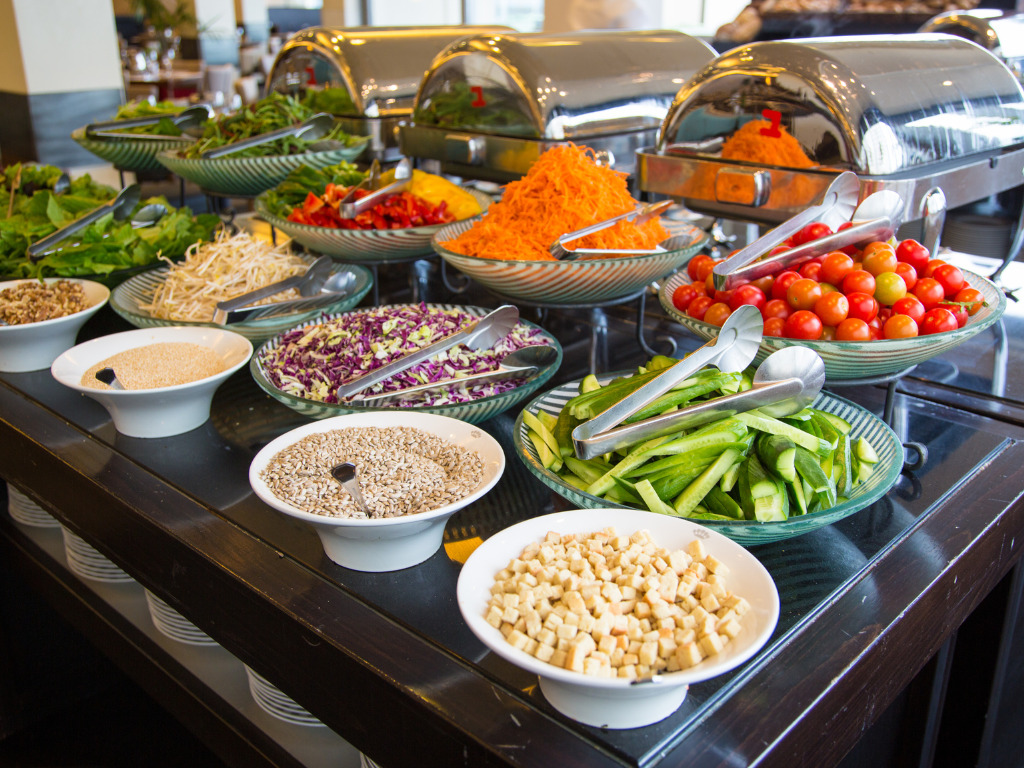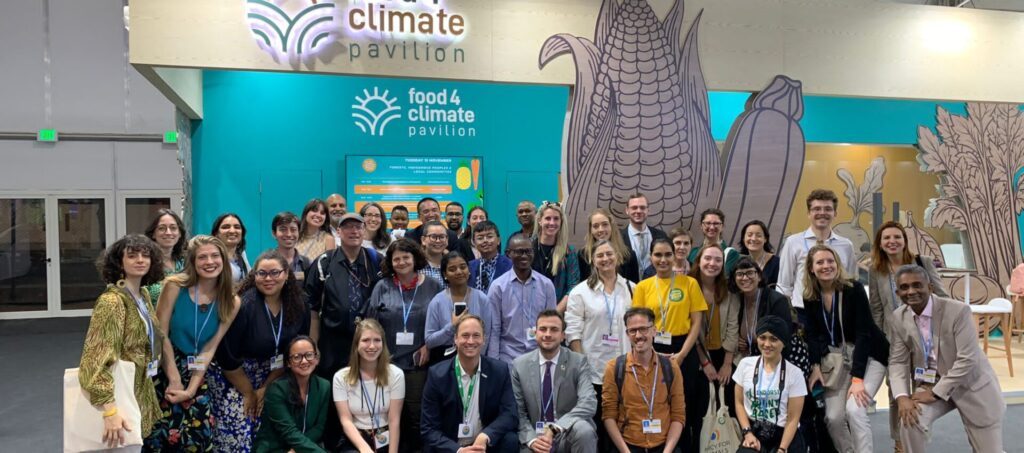COP28 Will Be First Food-Centric UN Climate Summit with Alt-Protein, Sustainable Diets on the Agenda
5 Mins Read
COP28 made headlines last month when it announced it will serve mostly plant-based food – it signposts the increased focus on food systems at this year’s UN climate summit (November 30 to December 12), in contrast to years past. In addition to mostly vegan catering, the conference will see food policy announcements and a Food4Climate Pavilion.
The link between climate change and agriculture is clear – food systems are responsible for a third of all human-caused global greenhouse gas emissions. The link between climate change and meat should also be fairly obvious – animal agriculture has been found to produce between 11-19.5% of the planet’s emissions, and one study has revealed that animal-derived foods cause twice as many emissions as plant-based foods.
Despite all the evidence, food has been a touchy topic at the world’s top climate summit for years. At COP26 in Glasgow, the UN introduced climate labels to its meat-heavy food menu, with some animal-based dishes having a carbon footprint 30 times higher than plant-based options. But it failed to add food and livestock farming to the agenda. And last year’s summit in Egypt hosted its first-ever pavilions dedicated to food system changes, and yet cutting meat and dairy wasn’t on the agenda.
It hasn’t been helped by the severe underreporting about the impact of livestock farming on the climate crisis (only 7% of climate stories in the media mention animal agriculture), nor the lack of global climate funding dedicated to food and agriculture. Intensive lobbying by the meat and dairy industries – who receive billions in subsidies from many of the governments attending COP conferences – against the plant-based sector exacerbates this issue and leads to misconceptions among consumers – signalled by the 74% of Americans who don’t believe eating meat has an impact on climate change.
COP28 shines a light on food, finally
This year, however, the tide seems to be turning. Last month, the UN confirmed it would be featuring predominantly plant-based food on its catering menu at the conference in Dubai (which saw the opening of the UAE‘s first plant-based meat factory earlier this year). And this was a precursor of what’s to come – COP28 will finally have a heavy focus on food, with policy announcements and another food pavilion rounded off by a dedicated Food, Agriculture and Water Day on December 10.
This day will spotlight investment in innovation, procurement around regenerative agriculture, national transformation pathways underpinned by financing mechanisms, and project preparation, according to Raphaël Podselver, director of UN Affairs at food advocacy non-profit ProVeg International.
He says it’s the “first time we are having real discussions on food and agriculture at a COP summit”, and expects policy shifts aimed at advancing plant-rich diets and protein diversification, improving food security and reducing agrifood emissions.

Podselver calls COP28’s commitment to serve mostly vegan food “excellent progress”, but adds that there’s still work to do to raise awareness among UN nations about food’s impact on the climate, and solutions to cut emissions. “We believe the climate data is helping to push things forward, in particular, the latest report from the IPCC about the need to embrace plant-based diets to tackle climate change,” he says.
The IPCC report suggests that transitioning to plant-rich diets (alongside other alt-proteins) could result in a “substantial reduction in direct greenhouse gas emissions from food production”. But a leaked draft of the original report showed that the authors initially recommended a shift towards plant-based diets – before the wording was softened in the final version.
In any case, Podselver says COP28’s decision is precedent-setting: “We expect to see plant-based catering as well as emissions labelling on food embraced by other summits going forward. We certainly do not see this as a one-off, but rather another stage in a journey towards raising awareness of how to make our diets more climate-friendly.”
Food4Climate Pavilion and the North-South divide
This year’s summit will see a coalition of NGOs set up the Food4Climate Pavilion, the second time a COP conference will host it. This includes groups like ProVeg, World Animal Protection, Compassion in World Farming, Plant Based Foods Institute, Humane Society International, Mercy for Animals, and Four Paws, among others.
The Food4Climate Pavilion will highlight the importance of prioritising the production of alternative protein over animal protein, as well as tackle the overconsumption of meat in the Global North. A region seen as wealthier, and as a group, the world’s richest are responsible for 50% of total emissions, versus 7% for the poorest.
The wealth gap extends to climate consequences, too. A study has found that the richest humans would be primarily responsible for the climate-related deaths of poorer people if global temperatures reach 2°C above pre-industrial levels by 2100. The North-South divide was a point of contention at COP26, when thousands of people from the Global South couldn’t attend the conference due to visa and accreditation issues, lack of access to Covid-19 vaccines, and changing travel rules.

Policy shifts and a 1.5°C roadmap
COP28 will witness a host of food policy announcements to help mitigate its impact on climate change. It includes the UN Food and Agriculture Organization’s roadmap to limit global temperature rises to the 1.5°C limit outlined in the Paris Agreement. “To make a serious attempt at keeping within internationally agreed temperature targets under the Paris Agreement, we need to enable a shift to alternative protein production as quickly as possible,” explains Podselver.
But this target is under serious threat. Multiple assessments have found that limiting this temperature rise might not be possible, with many directly attributing this to the impact of food and agriculture systems. One study concluded that high-methane food consumption must drop to attempt to meet the target, as current levels of food emissions would cause at least 0.7°C of global heating by 2100.
In fact, research has shown that in a business-as-usual scenario, the world will emit around 1,356 billion tonnes of CO2e by 2100, which would take us well beyond the 1.5°C limit. Even if we stop all emissions from non-food sectors (energy and industry), food emissions alone will surpass the 1.5°C carbon budget.
Can we realistically keep to this target? Podselver points to a World Meteorological Organization report that shows there’s a 66% chance that annual global surface temperatures will temporarily exceed 1.5°C for at least one of the next five years. “The COP summits offer the world a chance of keeping to the 1.5°C target and we hope that by raising awareness of the impact of agriculture on climate change through our Food4Climate Pavilion, we will contribute to meeting that goal successfully,” he says.
He adds that there will be concrete discussions around the deforestation and methane commitments made at COP26. Additionally, the COP28 presidency “wants to get a Leaders Declaration on Food Systems, with concrete commitments to transform our broken food systems and mitigate emissions while ensuring food security for all”.




